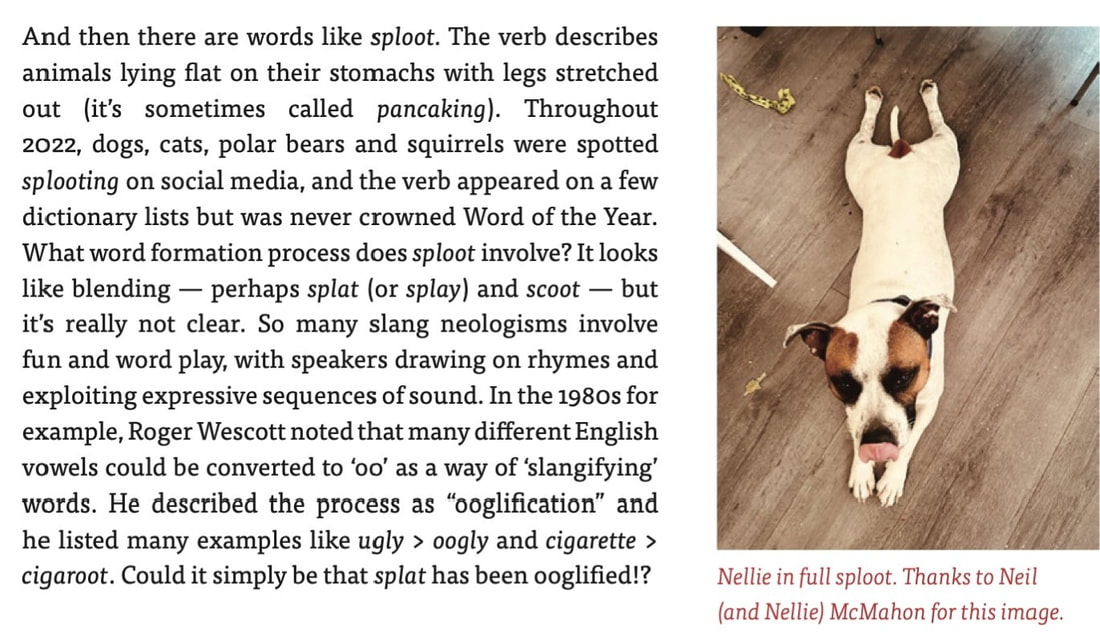|
Question
Hi Kate, Deb and Izzy, I now hear the terms “ lucked in” and “ lucked out” being used to mean the same thing. If you get lucky you can be said to have lucked in and also lucked out. I encountered this on the Wordle website when the robot ( bot!) analyses my successful solution. If you have a lucky guess it will say that you lucked out. How can something be both in and out but mean the same? PS I really enjoy your work and love your spot on Sammy J Thanks ,Jon Kate's response Thanks for your question Jon! There’s currently a lot of confusion around 'lucked out'. I use the expression, as you do, with the older meaning ‘be lucky’, but most of my students (and younger speakers generally) understand the opposite meaning ‘be unlucky’. So it's currently a contranym. The driver is probably the expression luck running out (or shit outta luck). But also words to do with luck typically deteriorate — as happened with 'put the mozz on something'. OZ mozz (from Hebrew mazzal ‘luck’) shows a similar shift from ‘luck’ to ‘bad luck’, as in put the mozz on (something) ‘to put a jinx on something’. There is undoubtedly an interesting psychological basis to this sort of deterioration (pessimistic nature of humans?). The expression 'lucked in' is a recent arrival as far as I can tell, and it’s presumably because of the shift in meaning of lucked out. Something similar is currently happening to the gorgeous word doozy. Currently there are two contradictory meanings out there — ‘remarkable, excellent’ and ‘bad’. The negative sense will win out — it always does. Question Can you explain the difference between "pitch" and "intonation" in terms of how VCAA uses them? Because as I was taught, 'intonation' is changes in pitch, whereas pitch relates to how high or low something sounds. But VCAA uses transcript symbols which indicate 'rising pitch' and 'falling pitch' (which sound like changes in pitch, which relate more to the definition of intonation!), and 'continuing intonation', 'final intonation', and 'questioning intonation', which I'm not sure what these exactly mean. (From Jen)  Kate's response That’s a really good question Jen — those terms often get confused (referring for example to the general the highness and lowness of voice). Here are the short definitions we’ve given in the glossary for the Lingo books, and they fit the account you’ve given here: Intonation is the way pitch changes across an utterance. See also intonation contour. Intonation contour is a distinctive sequence of pitches in an utterance. Pitch relates to how high the voice is, reflecting how quickly the vocal cords vibrate. So pitch refers, as you’ve described, to the highness and lowness of tone or voice, and intonation is the distinctive use of pitch patterns in speech (sometimes called melody). Intonation reflects a speech style that’s appropriate to the utterance and the context; for instance, the degree of formality and/or authority. The following example shows a pitch trace (in blue), and you can see that there is an utterance-final “high rising terminal/tune/tone (or HRT)” in the sentence The mentally ill man who burnt down the St Kilda kiosk last year’s been jailed for three years. It’s a speech style that is more likely to resonate with a younger age group (this sentence was read by a female newsreader on a mainstream Melbourne FM radio station — and many thanks to Jenny Price for this example). The various labels this distinctive intonation goes by underscore the confusing terminology here: rising inflection, upspeak, uptalk, high rising intonation, Australian questioning intonation. (And of course HRT is confusing enough!) "A natural progression. Nellie Belle is now immortalised in the academic textbooks -- starring in a new VCE English textbook from Monash's Dept of Linguistics called Love The Lingo, as exhibit A for "splooting"! So proud. She is the first member of her family to go to university." From Neil McMahon, who kindly allowed us to use this image of Nellie splooting in Love the Lingo.
|
Authors
Prof Kate Burridge and Archives
May 2024
Submit your question via the Contact form or by emailing us at: [email protected] |
